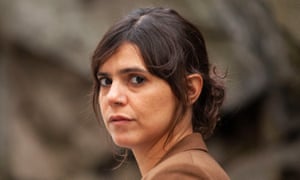BOOK OF THE DAY
Lost Children Archive by Valeria Luiselli review – border crossings
A New York family takes a road trip south, in this rigorous and beguiling novel about child migrants on the US-Mexico border that has been longlisted for the Women’s prize
Lucy Hughes-Hallett
Friday 15 March 2017
A
family of four, in which neither child is child to both parents, leaves New York and drives towards the borderlands of Arizona. In the back of the car, along with the usual luggage, are seven boxes. Those belonging to the adults contain books and documents, CDs and newspaper cuttings. Those belonging to the children, aged five and 10, are initially empty but fill up over the course of the journey with images and transcriptions of sounds, traces of their experiences along the way.
The novel is like those boxes. Orderly in arrangement, eccentric in the selection of its contents, it is at once intellectually rigorous and engagingly humane. Into it is crammed an account of love’s fade-out, a tender depiction of a pair of children from the point of view of a distracted mother, and a road trip full of allusions to other road trips, from the 13th-century Children’s Crusade to those described by Jack Kerouac and Cormac McCarthy. There is also another dreamlike Odyssey-narrative, purportedly written by someone else, that recounts, with much literary quotation, the tribulations of a group of children attempting to cross the Mexican border, and a child’s-eye account of a voyage into a kind of outer space or perhaps outer time, in which fictionalised fact and childish fantasy merge with a riff on David Bowie’s “Space Oddity”.Valeria Luiselli was born in Mexico but has lived most of her life in the United States. She is bilingual, but this is her first book written in English; it has been longlisted for the Women’s prize. We know from her previous non-fiction book Tell Me How It Ends that she, like the woman in this novel, has been working to help some of the undocumented children entering, or attempting to enter, the US from Mexico and points south. That book was her polemic. In this novel she draws on the same material to do something more imaginative, more intimate, and stranger.
Early one morning, after weeks of days playing word games in the back of the car and nights in motels, the two children run away. If they are lost, thinks the boy, perhaps their mother will begin to care about them as much as she cares about the would-be immigrant children with whose stories she is filling their nightmares. With only the vaguest idea of where they are going, they set off into the desert. Many miles from any railway track, they come across an abandoned train carriage open on both sides, a doorway between different states of being. There the children from the realistic framing narrative (which is made up) encounter four children from the elaborately poetic book-within-the-book (which is factual reportage). As mirage and reality meet, a storm breaks. Can the children be saved? It would seem too far-fetched to be credible, but of course the lost children of the title, the tens of thousands of unaccompanied minors who do, in reality, attempt to cross these deserts in the hope of finding safe haven, are launched on their journey by relatives or friends hoping for a happy ending every bit as improbable.
The man and woman (they have no names) are both makers of audio documentaries. They met when working on a project to record all the languages spoken in New York, a reminder of how that city, and the entire USA, grew by welcoming in outsiders. As their long drive begins they each have new projects. He wants to record aural traces of the Apaches who once populated Arizona (another reminder that all but a few present-day Americans are non-indigenous). She wants to find two Mexican girls, last seen in detention near the border, and also to record or document or remember or understand – her purpose isn’t clear to anyone, including herself – the many children who have died crossing the borderlands. They are both seeking to capture something essentially evanescent: sound. The book is full of echoes, both metaphorically in Luiselli’s copious use of quotation, and actually. In Echo Canyon the children and their parents hear each other’s voices reverberating off the canyon’s sides.
Luiselli is an ambitious writer. Her previous novels, including The Story of My Teeth, were full of playful formal experiment. Here there are two main narrators, the woman and the boy. Their accounts are dovetailed, each giving a distinct view of identical episodes, each split into short sections with matching subheadings. The boxes packed by the adult characters are filled with books by a cosmopolitan selection of literary heavyweights (Rilke, Pound, Andrzejewski), all of whom resonate in the text. In a virtuoso piece of writing, as the children, delirious with heat and fear, trudge through the desert, Luiselli unleashes a sentence that unfurls over 20 pages, swooping easily from one stream of consciousness to another, and somehow carrying the reader with it. But for all its cleverness, this is also a warm and funny novel, equally droll in its treatment of the precocious, anxious children and its mockery of the solipsistic adults who are so careless of them.
It ends with two dozen blurry Polaroids, supposedly taken by the boy, actually supplied by Luiselli and showing a curly haired small girl, her real-life daughter. The effect is mysterious and disconcerting. It recalls WG Sebald’s The Emigrants, another book in which fact and fiction seemed to be changing places. Lost Children Archive, in its seriousness and beguiling oddity, is a welcome addition to the Sebaldian genre.
• Lost Children Archive is published by 4th Estate (£16.99).




No comments:
Post a Comment